Take heed to the interview with Alex Shevrin Venet (transcript):
Sponsored by EVERFI and Listenwise
This web page comprises Amazon Affiliate and Bookshop.org hyperlinks. Whenever you make a purchase order by way of these hyperlinks, Cult of Pedagogy will get a small share of the sale at no further value to you. What’s the distinction between Amazon and Bookshop.org?
Among the many many challenges academics have confronted for the reason that onset of the pandemic, one which persists is this sense that college students have modified, that they’re much less motivated, extra entitled, and extra disrespectful than ever earlier than. Even when a instructor can discover loads of proof to help this notion, it might’t be making issues any higher.
And whereas it does appear that the pandemic exacerbated this sense amongst academics, I noticed it lengthy earlier than we ever heard the phrase Covid. Within the late 90s and early 2000s, I labored with far too many academics who held a fairly low opinion of a lot of our college students. There was a whole lot of “These children (insert adverse generalization)” or “Effectively what do you anticipate from him, he (insert adverse generalization).”
I believe many of those attitudes come from an actual, legitimate, and weak place, from academics who as soon as had excessive hopes however felt disenchanted and harm when issues went flawed, academics who had good intentions and acquired their hearts damaged a bit bit each time college students rejected their efforts, academics who see behaviors from their college students that shock and frighten them. However no matter the place they arrive from, these mindsets harm {our relationships} with college students, and that makes every part else worse, from habits to teachers to the tradition of faculty as a complete.
So with all of this in thoughts, I used to be intrigued after I got here throughout the phrase unconditional constructive regard. It was in Alex Venet’s e-book, Fairness-Centered Trauma-Knowledgeable Training (Amazon | Bookshop.org), the place she names it as an important guiding philosophy in her work. Venet explains that unconditional constructive regard is a stance that communicates this message to college students: “I care about you. You might have worth. You don’t need to do something to show it to me, and nothing’s going to vary my thoughts.” In her e-book, she asserts that taking this stance and placing it into apply builds the inspiration on which our college students can thrive. And the extra I realized about it, the extra I used to be offered on its worth.
However I believe that for many academics, adopting this philosophy gained’t be a simple activity, as a result of the calls for of the job are so intense and the difficult behaviors college students convey to high school are so overwhelming. For some, even the thought of this philosophy could be off-putting at first, since you would possibly see it as simply one other model of teacher-blaming. Nevertheless it’s not. Unconditional constructive regard doesn’t take accountability away from college students for his or her habits; it simply works on the lens academics use to handle it, and that lens could make an enormous distinction, not solely in the way you work together with college students, however how you are feeling concerning the work you do each day.
As a result of I believe unconditional constructive regard is such an necessary, revolutionary philosophy, and since implementing it may be difficult, I needed to raise it out of the e-book and provides it particular consideration. I already did an interview with Venet concerning the bigger idea of trauma-informed educating, however she agreed to have a separate dialog simply on unconditional constructive regard. You may hearken to our dialog within the participant above, learn the full transcript, or get a peek at a few of the key factors of our dialog beneath.
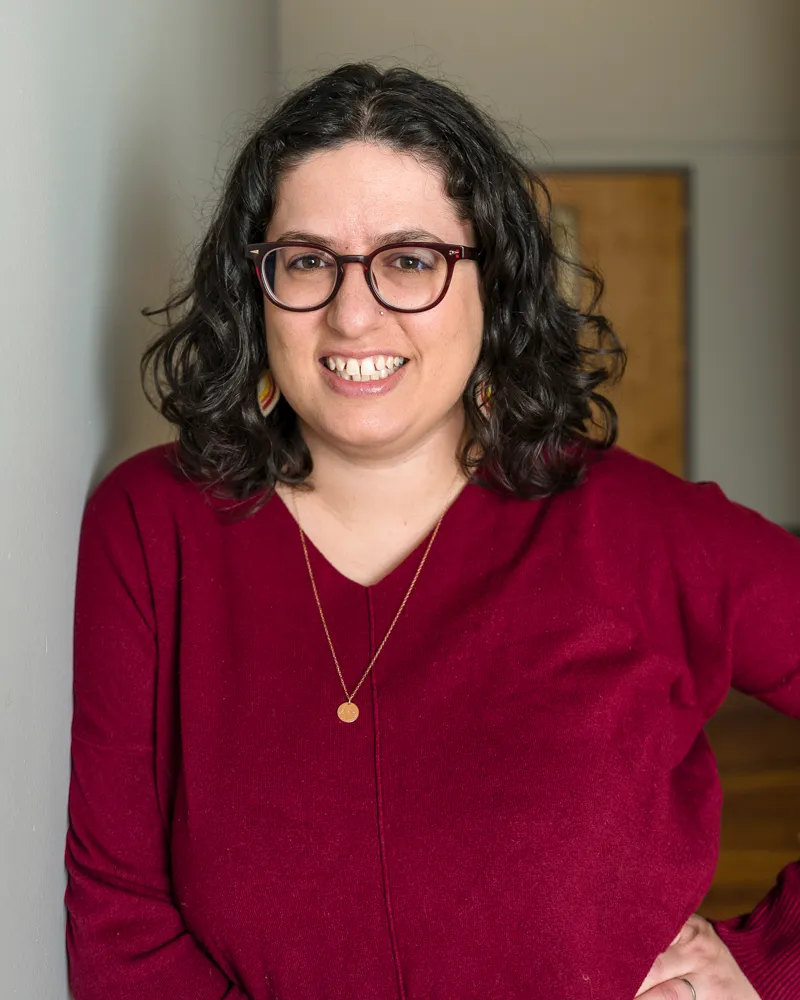
What’s unconditional constructive regard, and why is it such an necessary a part of trauma-informed educating?
“Unconditional constructive regard means I care about you, you have got worth, you don’t need to do something to show it to me, and nothing will change my thoughts,” Venet says. “So it’s actually this concept of seeing any individual as a complete and full and worthy particular person ranging from a spot the place care doesn’t need to be earned, it’s simply assumed. All people will get care. You’re allowed to mess up. You’re allowed to have struggles, however that’s by no means going to invalidate your price, and it’s by no means going to invalidate my look after you.”
The idea was launched to psychotherapy by Carl Rogers within the Sixties and utilized to schooling by Alfie Kohn in a 2005 essay known as Unconditional Instructing. Venet sees this stance as foundational in her work in equity-centered trauma-informed educating “as a result of it begins from that place of scholars are worthy, beneficial individuals.”
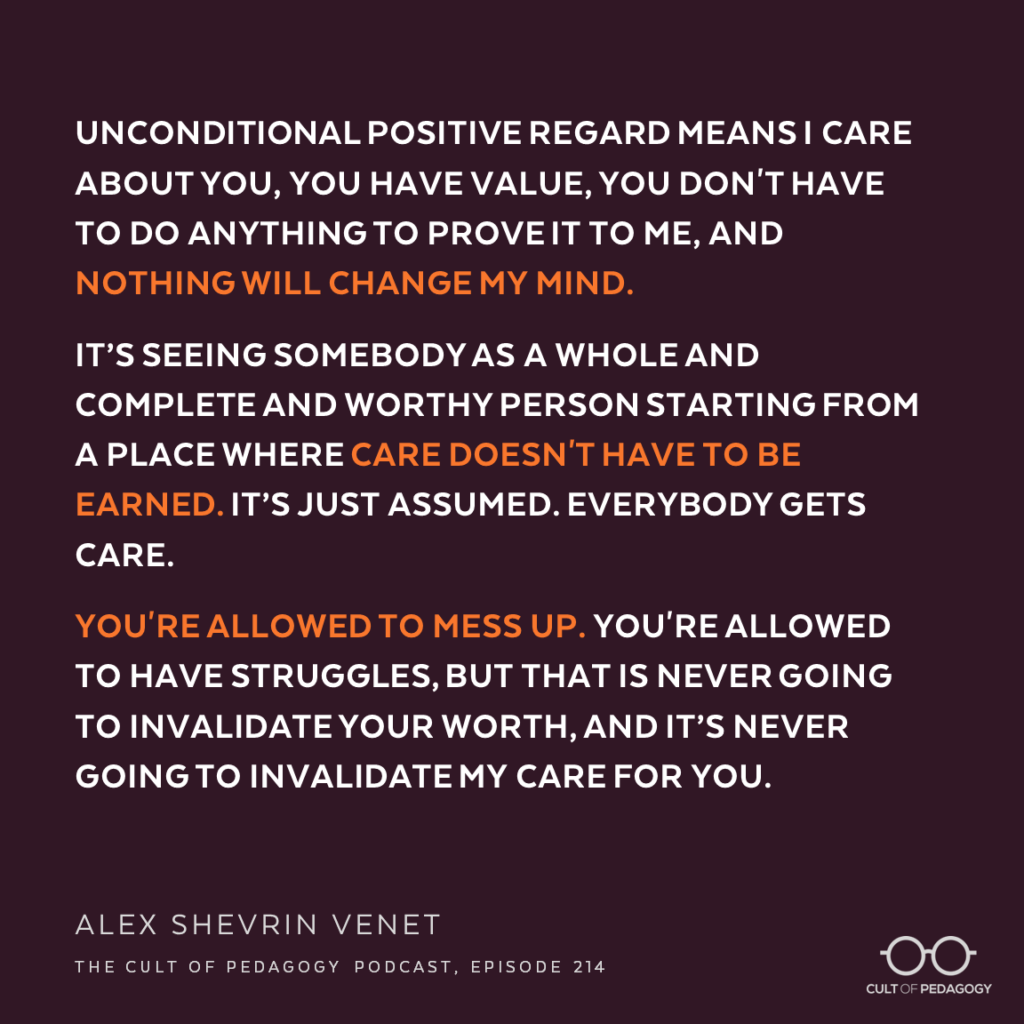
What does unconditional constructive regard appear like in apply?
“One of many issues that permits for unconditional constructive regard is to only get to know college students,” Venet explains. “I imply it’s fairly primary however to get to know what they care about that’s not essentially associated to the content material. When you solely are taking a look at a child and going, oh, you’re good at writing, you’re good at science, no matter, then your regard goes to be conditional since you’ve positioned parameters round what sorts of strengths I’m going to see in you.”
It’s particularly necessary to make this a precedence for college students with whom you don’t have a lot in frequent. “If I meet a pupil who is actually into cats and the identical TV exhibits as me and we have now an analogous humorousness, it’s straightforward for me to love them, to care about them,” Venet says. However with college students who solely needed to speak about Roblox, for instance, “It was a bit onerous for me to search out okay, the place’s my connection level? If I reground myself in, okay, if I’m going to imagine this pupil has worth, I care about them, I want to only get inside a bit bit. What makes them tick? So inform me about Roblox. What do you want about it? How do you are feeling if you’re enjoying it? Who do you get to attach with if you play Roblox? The place did you first find out about it?” Taking deliberate steps to get to know college students as they’re, outdoors of the context of your classroom, may help you see them as entire individuals.
Together with attending to know college students, academics working towards unconditional constructive regard additionally work to find out about components in college students’ lives that make them behave in ways in which trouble the instructor.
“If a pupil appears to by no means concentrate after I’m speaking,” she explains, “I’m not going to go instantly to a spot of, Effectively, they’re not paying consideration as a result of they don’t care. As a substitute, I’m going to get curious and go, possibly one thing’s happening that’s distracting. Perhaps they simply have a tough time paying consideration. Perhaps I’m being type of boring.” This stance of curiosity — each for attending to know the scholar and determining what issues could be inflicting issues — is important for constructing unconditional constructive regard.
What about when college students change into particularly tough? What insights are you able to supply to academics for these occasions?
Venet shares the story of a former pupil, “Julia,” who refused to take part, stored her head down more often than not, and hurled verbal insults at Venet when she tried to attach together with her. Had she not been supported by her colleagues to take a stance of unconditional constructive regard, “I may have give you some conclusions like she’s disrespectful, she hates me, she hates college, she doesn’t care about her schooling. However by holding this unconditional constructive regard, which primarily says with no proof, I’m nonetheless going to imagine that she has worth and I’m nonetheless going to care about her, with no proof that may help that, I gave it time.”
Throughout this time, Venet made rather more delicate bids for connection. “She wouldn’t speak to me at school, but when I used to be standing subsequent to her within the lunch line, then I may make a bit remark to her, and he or she would generally reply to it. I began to speak to her different academics and attempt to discover out a bit bit. Like, what does she like? What makes her tick? She was actually good at drawing, and so I began to see her artwork. I began to search out some connection factors. So then the subsequent time she is available in, within the half a second earlier than she places her headphones in, I may say, hey, I noticed you drawing in your final class. Can I see what you drew? And possibly she leaves one earbud out to begin to speak to me about it.”
As this course of unfolded, Venet started to grasp that Julia’s habits got here from previous trauma. “She has been actually harmed by individuals in her life earlier than and he or she’s defending herself. She’s defending herself as a result of the identical method that I don’t have proof for her, she has no proof for me. She doesn’t know that I’m protected. She doesn’t know that I believe she will be able to be taught. She doesn’t know any of that. Out of the 2 of us, one among us needed to take a leap of religion, and he or she’s the child so it must be me. I’m the instructor so it must be me to do this. And so I caught with it for her till we gained that belief and till we have been in a position to construct it up.”
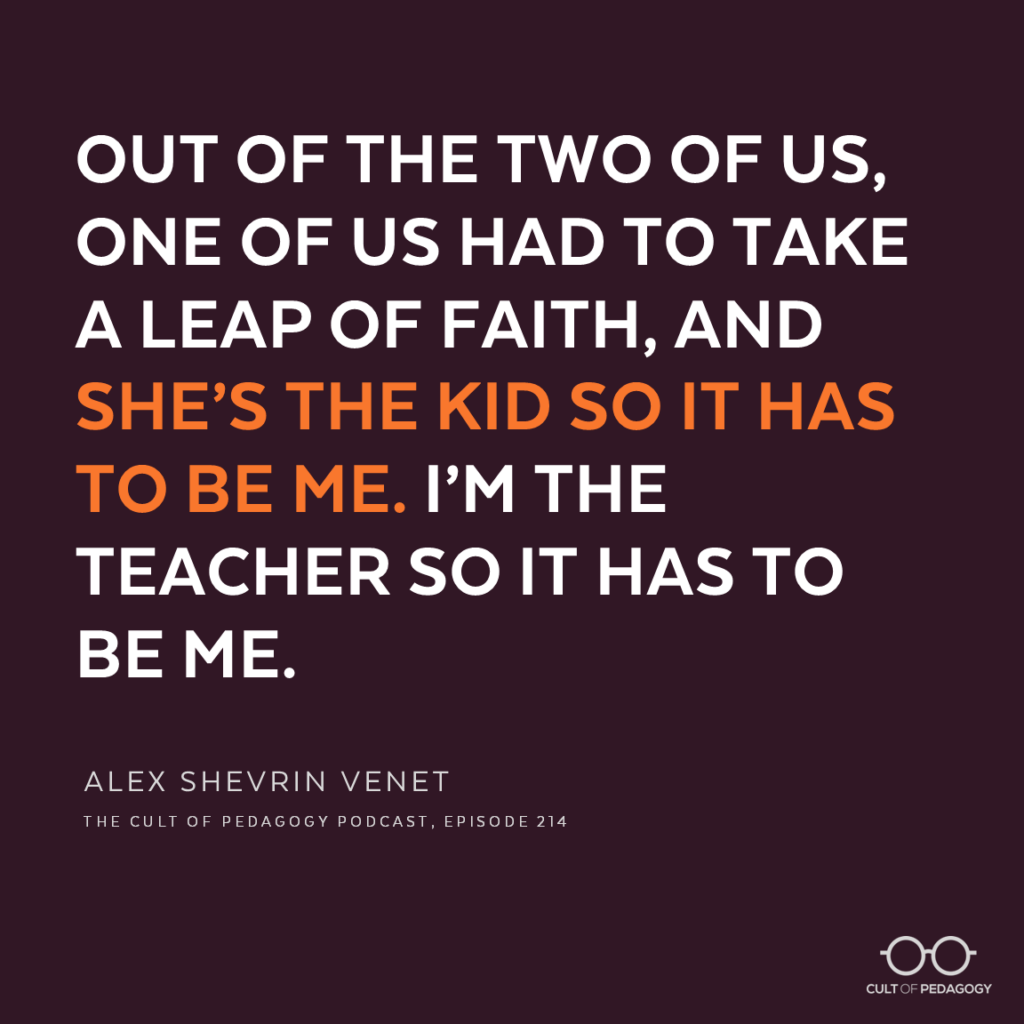
One quote that Venet retains in thoughts in these tough occasions comes from the e-book Trauma-Responsive Education (Amazon | Bookshop.org). “There’s a coach in that e-book who’s teaching a few of her friends, and this query that she asks of different academics is, How would you reply otherwise in case you knew the scholar’s habits wasn’t a selection? If I have a look at Julia and I say, her habits’s a selection. She is selecting to be imply to me and be disrespectful. Then possibly the motion that I’m going to take is to say effectively, I’m going to punish her for it. I’m going to withdraw my a part of the connection. I’m going to place up a wall if she’s placing up a wall.”
Unconditional constructive regard takes issues in a special path. “If I have a look at her and I say, possibly this isn’t a selection, however it’s a protecting response to attempt to not get harm by one other grownup, then I’m going to reply how I did, which is I’m going to keep it up. I’m going to attempt to earn her belief whereas all the time holding this concept that I believe we’re going to get there sooner or later.”
Even when the habits IS a selection, Venet says, taking this stance helps the instructor strategy the state of affairs in a more healthy method.
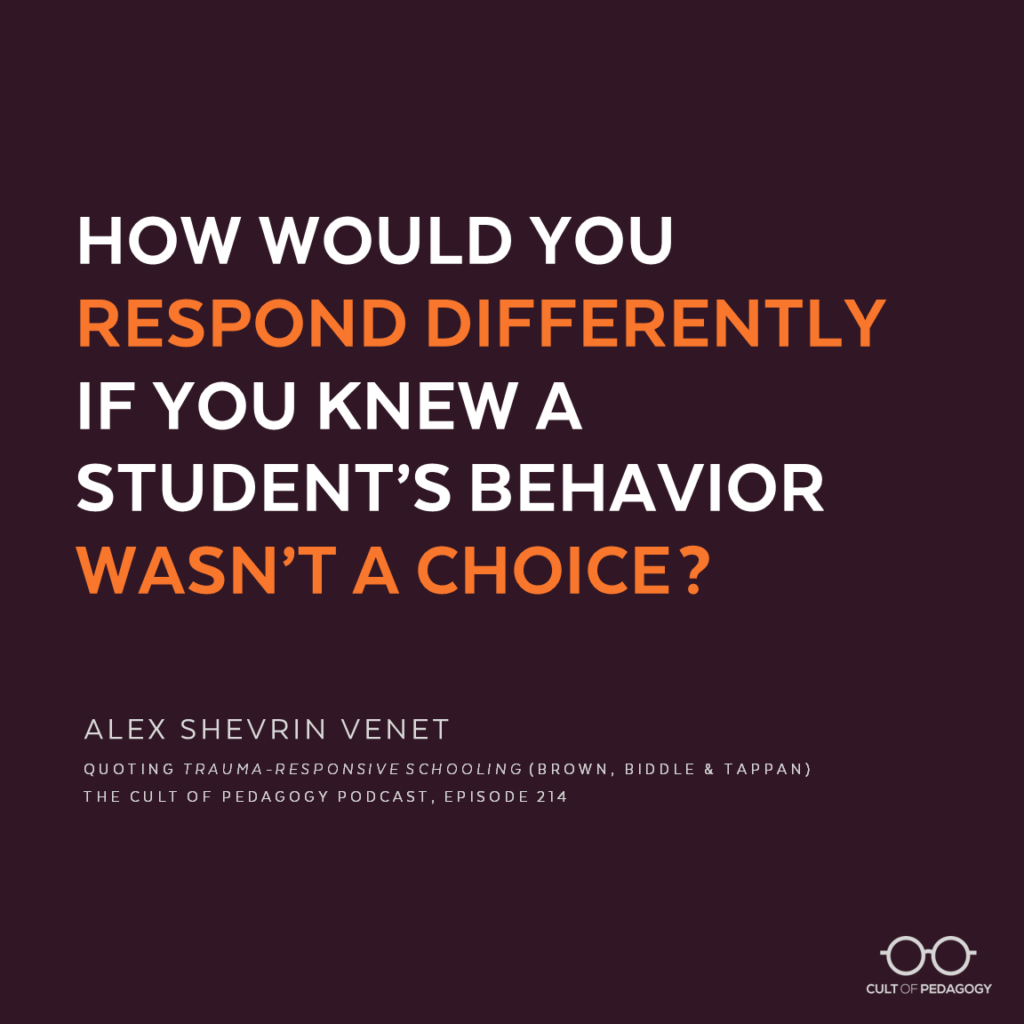
You advise academics to have common “perspective-keeping” conversations with colleagues to assist keep on observe with unconditional constructive regard. Why are these necessary and the way do they assist?
“The connection between a pupil and a instructor is just not equal,” Venet begins. “If I used to be going to fulfill up with a pal, and my pal known as me a extremely horrible phrase and put her headphones in, I may simply go, effectively, I’m not going to tolerate that from my pal. I don’t need to spend time with this particular person. That’s not the identical relationship we have now with college students; college students are required to be there and also you’re required to show them. However because the grownup, we have now extra energy. Now we have the power to impose penalties that may have long-lasting impacts.
“And so if a pupil hurts my emotions, it’s okay for my emotions to be harm. It’s okay for me to say, that felt actually unhealthy. I hated that. I don’t need to tolerate that habits from individuals round me. Nevertheless, the scholar can by no means be answerable for making me really feel higher or be answerable for my feelings as a result of the ability differential is just not equal. I can’t make that pupil answerable for me as a result of they’re not. They’re required to be at school. I’m required to show them.”
However academics shouldn’t really feel like they’re trapped with their emotions; they will get assist from their colleagues. “I can go to my colleagues and discuss how I used to be harm, they usually can say, yeah, that sounds actually onerous. We are able to course of it. After which they may help me reset and say, okay, how are you going to point out up tomorrow given the truth that you’re feeling actually harm? How will you proceed to carry this regard for her despite the fact that she is harming you?”
And if the scholar actually crosses a line? “For instance, if the scholar was calling me a slur primarily based on my id,” Venet affords, “then I have to have individuals round me who can say, yeah, you shouldn’t return in that room together with her tomorrow however she nonetheless deserves a instructor, so we’re going to tag out. Anyone else goes to work together with her. We’re going to work on educating her. We’re going to unravel this downside. It requires a crew effort. And I believe that is the place individuals have a tough time after we discuss unconditional constructive regard, as a result of in case you are the one particular person in your constructing who’s attempting to make this shift, it’s actually going to be tough as a result of our colleges usually are not set as much as foster this.”
“If we decide to an ethic of care, constructing relationships and caring for our college students aren’t methods within the identify of accelerating educational achievement however the precise aim itself.” That is from web page 100 of your e-book. Embracing this stance can be an enormous paradigm shift for a lot of U.S. educators. Why do you suppose it’s price contemplating?
“It’s mainly the alternative of what we do in colleges proper now,” Venet says, “and colleges proper now are so poisonous in a whole lot of methods. What would it not appear like if children simply felt protected and cared about as a part of their college expertise? There’s all this competitors in colleges, whether or not or not it’s sports activities or excellent attendance awards or grades and scholarships or no matter, and folks justify this by saying, effectively that’s society and what would you like? That each child will get a trophy? Effectively, what I need to ask is, have you ever ever been in an setting the place each child truly did get a trophy and seen how stunning it was?
“On the college the place I taught, they used to do that finish of the yr ceremony that was for youths who have been graduating but additionally each child in the entire college, and it was a small college so this was doable. And we truly gave a personalised educational award to each single pupil. All of the academics who shared college students would fill out these little sheets of paper and type of mirror on what was a few of the educational development that you simply noticed this yr. And we might create an award for each single child, after which at this ceremony give them out. And it was completely stunning. The youngsters actually didn’t care that everyone else was getting an award as a result of what their private award stated to them was my academics noticed and seen this factor I labored actually onerous on. So each child getting a trophy? I don’t know. I believe that’s nice.
“I believe an enormous a part of why our world is so traumatic proper now’s a sense of shortage and competitors, that there’s solely restricted sources, and all of us need to claw at one another to get the sources, and in case you’re in the way in which of that then you definately’re my enemy. What if, as a substitute of replicating that at school by saying there’s solely three sports activities awards, there’s just one senior award, what if we work from abundance and stated there’s sufficient for everybody? There’s sufficient care for everybody. There’s sufficient celebration for everybody. And truly celebrating you doesn’t imply that I lose. It implies that all of us have gained collectively. After we make small decisions as academics to work from a spot of unconditional care, we’re planting the seeds for these larger adjustments.”
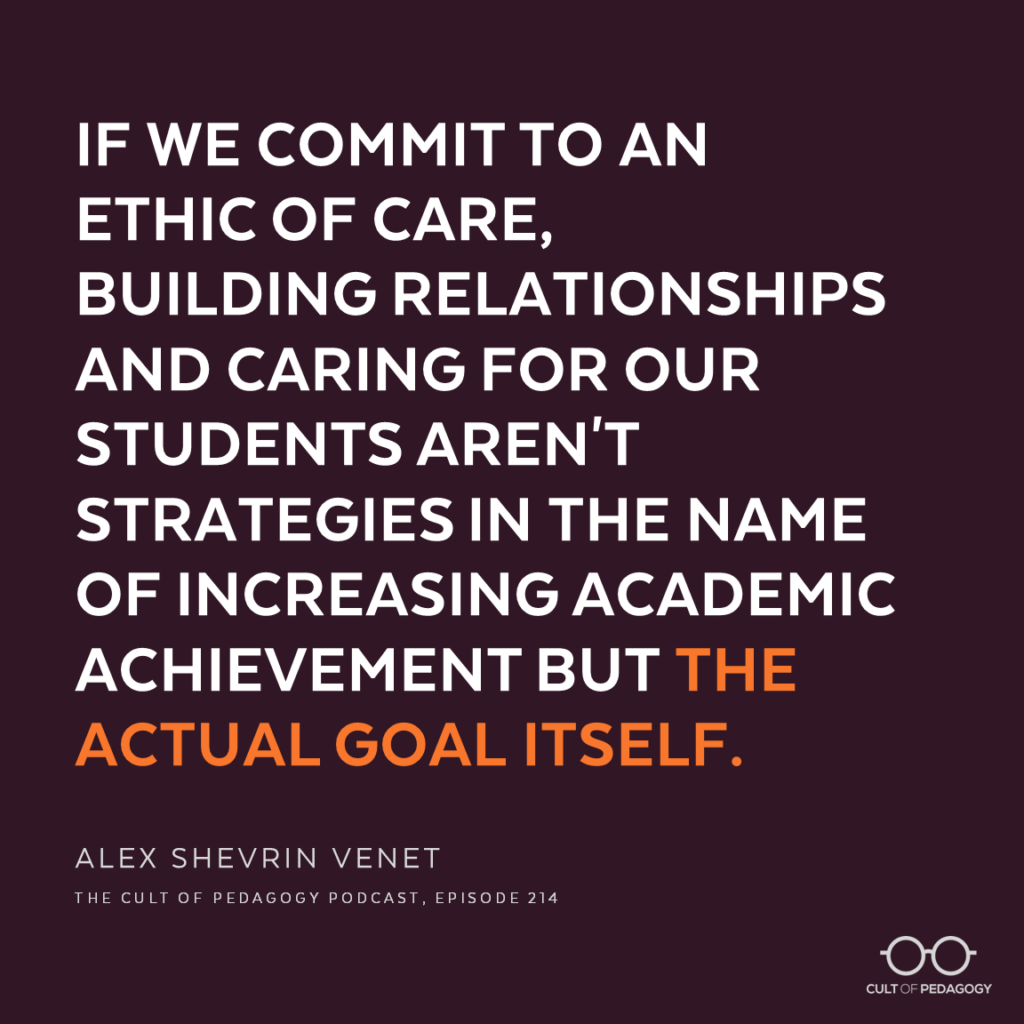
You will discover Alex Shevrin Venet’s work at unconditionallearning.org.
Be part of our mailing record and get weekly suggestions, instruments, and inspiration that can make your educating simpler and enjoyable. You’ll get entry to our members-only library of free downloads, together with 20 Methods to Reduce Your Grading Time in Half, the e-booklet that has helped hundreds of academics save time on grading. Over 50,000 academics have already joined—come on in.

